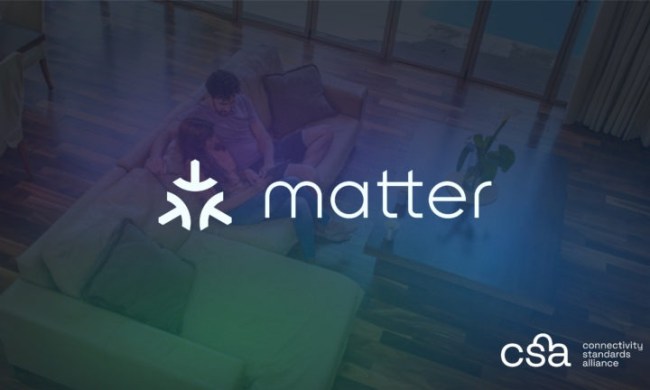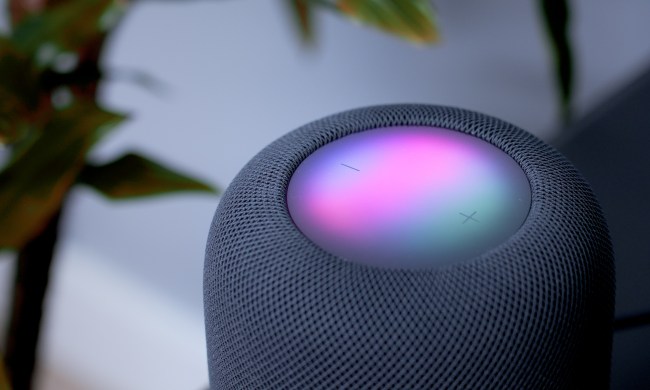Our smart homes are about to get even smarter. In a landmark move, big tech’s biggest names — Amazon, Google, Apple, Zigbee, and others — have joined forces on an initiative to create a unified, cross-brand experience covering the entire smart home device space. Once referred to as Project CHIP (Connected Home over IP), the latest handle for the partnership is Matter.
Combining research and development from all major brands under the umbrella, Matter is aimed at providing a shared smart home interface for device users where all smart devices are designed using the same platform. While this doesn’t necessarily mean that individual control apps for smart devices are disappearing (the Alexa app, Google Home, Apple’s Home app), what it does mean is that, for the first time, your Apple HomePod speaker and Alexa-powered Ecobee thermostat will be able to communicate using the same “smart language.”
Matter will enable communication across smart home devices, mobile app and cloud services and to define a specific set of IP-based networking technologies for device certification.
Matter-enabled smart devices were supposed to hit the market in 2020, but the coronavirus delayed the first batch of hardware drops until sometime in late 2021.
Apple HomeKit, Apple’s software hub for Apple-specific smart home controls, is one of the leading brands involved in the building blocks of Matter and its eventual rollout. For HomeKit-powered devices like the HomePod, Apple TV, and Logitech video doorbell, HomeKit will likely receive some Matter-focused alterations later this year. Here are four advancements to potentially look forward to with this collaboration.
More hardware for Apple HomeKit

One of the major selling points of the Matter collaboration is interoperability across the smart home landscape. To help illustrate this point, let’s explore both a past and present developer scenario. Two years ago, let’s say, an up-and-coming smart device developer is laying the software grid work for its new IP (intellectual property). In the past, a developer would need to design their device’s capabilities around the framework of a single smart platform, a choice that may not have been easy to make.
Maybe the developer thinks HomeKit will offer a smoother UI (user interface)? But if the developer chooses HomeKit, what are they losing in terms of the Alexa, Google Assistant, or SmartThings platforms? And how will the choice of platform dictate how well the new product sells? These are issues of concern that dwindle in the present-day scenario. Let’s imagine this same company developing hardware post-Matter.
With Ethernet, Wi-Fi, and Bluetooth Low Energy technologies, Matter’s suite of IoT (Internet of Things) tools makes it much simpler for the developer to focus on the features and functionality of its IP because, in the end, whether you’re using HomeKit or Google Assistant, Matter should allow the new device to work across all smart platforms.
In a nutshell: Expect less HomeKit and Alexa-only designations and more Matter-certified products.
Cross-compatibility between brands

Own an Echo smart speaker? That means you’re using Alexa to control it. HomePod Mini? That would be Apple HomeKit. Quite frankly, it’s hard to imagine Amazon or Apple relinquishing its smart platforms on first-party control devices. What does seem possible is the following:
Imagine the average smart home. Let’s say the household primarily runs on Alexa, but there’s a new robot vacuum being released that offers some pretty amazing Siri functions. With Matter in place, that robot vac will have been designed with both Alexa and HomeKit controls in mind. Perhaps we can look forward to a single Matter control app that allows you to manage all smart home devices under one roof. Potentially, once that robot vac is connected to your Wi-Fi, it can even be voice-controlled using both HomeKit and Alexa.
Backward compatibility for older HomeKit gear

Matter isn’t just about what’s new for the smart home. While the first wave of new Matter-certified hardware is expected to drop later this year, we imagine that through software updates, various aspects of Matter’s UI could be implemented across older iOS devices for expanded usage.
What does this mean? Maybe that older HomeKit-powered Logitech camera will receive a number of encryption advancements for safer cloud storage of motion-triggered videos? Or maybe there’s a great Android-specific feature that, in years past, was only available on Android hardware. With Matter, your older HomeKit gear may get to take advantage of Google’s hard work. It’s a lofty prospect, but there’s plenty that can be implemented with even the most basic software updates.
And if not by software, then perhaps by some kind of device bridge. According to the Connectivity Standards Alliance, Matter will be releasing a series of web-connected bridges. While details on this hardware is still under wraps, we could see a Matter bridge allowing your older HomeKit hardware to interface with the new protocol.
Elevated entertainment

Picture this: You’re sitting in your living room, listening to your favorite playlist through the Music app on your Apple TV. The streaming hub is lined directly into your TV with sound outputted to your soundbar. These songs really take you back, which makes you want to get up from the couch and listen to the music throughout your home while contemplating your existence. The only trouble with this existential endeavor is that you only own Echo speakers. Currently, If This Then That (IFTTT) is one of the only ways to bridge the gap across developers and your only hope of getting Apple tunes off of an Apple device and onto other hardware (the Echo speakers). With Matter in place, this cross-device holdup may simply cease to exist.
The first wave of Matter hardware could see everything from lighting (Philips Hue confirmed) to TVs being integrated under the unified platform. Imagine being able to automate your previously Alexa-powered lights using a Matter app, while seamlessly casting content from your Apple TV to an Android-powered TV in another room of your home.
Yes, it’s a bit of a wild example, but knocking down the barriers between brands truly opens the door for unlimited entertainment possibilities. For now, we’ll just have to wait and see exactly what Matter has in store for us and our smart homes.



